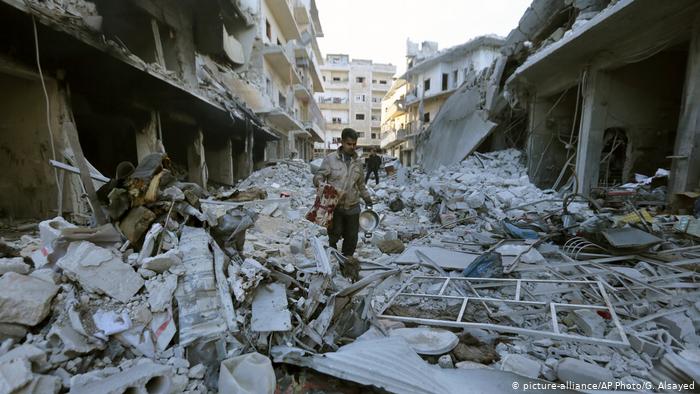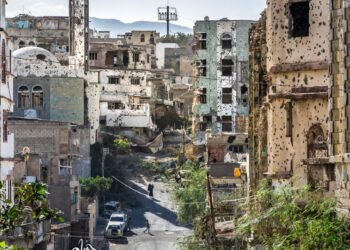The past ten months have been the quietest in the history of the Syrian conflict, but it is a fragile calm, according to the special envoy to Syria Geir Pedersen, who stressed before the Security Council today that this calm “could collapse at any moment.”
In his briefing today at the UN Security Council session on Syria, the Special Envoy said that “millions of Syrians inside the country and millions of refugees abroad suffer from profound shocks, extreme poverty, personal insecurity and lack of hope for the future,” calling for ensuring that “a solution The conflict in Syria is one of our common priorities. ”
In his speech, Pedersen explained that the events of the past month showed us the fragility of the situation in Syria, as there was a sudden and major escalation of the situation around Ain Issa in northeastern Syria. Intensification of airstrikes attributed to Israel; And ISIS attacks continue in the eastern and central regions; Shelling and airstrikes in and around Idlib. And turmoil in the southwest, saying that “this is also very relative calm,” as civilians are still being killed in crossfire and IED attacks. They still face a host of other risks – from instability, arbitrary detention and kidnapping to criminality and the activities of terrorist groups on the United Nations list.
The political process has not yet brought about real changes

Photo from the archive: The UN Secretary-General’s envoy to Syria Geir Pederson in his address to the UN Security Council. (April 30, 2019.)
While the Syrian people face poverty and insecurity, and many hopes and dreams are dispersed, the Special Envoy saluted the work of Syrians in civil society, saying that they “continue to work to do what they can to improve the situation and support the political process,” noting that he was able to communicate with many of them during late December December, through the civil society support room.
However, the Special Envoy pointed out that “the political process has not yet achieved real changes in the lives of Syrians, nor a real vision for the future.”
He explained that no steps have been taken that could actually build confidence, including full and unimpeded humanitarian access. Progress on the fate of detainees, abductees and missing persons, and the release of women, children, sick and elderly people; A nationwide ceasefire; To develop a cooperative and effective approach to confront terrorist groups on the United Nations list; Take steps to create a safe, calm and neutral environment; And external and internal steps to address the social and economic crisis.
Moreover, there are no political talks among Syrians except on the constitutional track. The free and fair elections that will be held under a new constitution under the auspices of the United Nations, as foreseen in Security Council Resolution 2254, seem distant in the future, according to Pederson.
Solutions are not in the hands of the Syrians or the United Nations alone
While the Special Envoy continues to assess the implementation of Resolution 2254, he emphasized that “No actor or group of actors can impose their will on Syria or settle the conflict. They must work together.”
“The operation must be owned and led by the Syrians. But the conflict is very international, with five foreign armies operating in Syria. We cannot pretend that solutions are in the hands of the Syrians only, or that the United Nations can do it alone,” he said.
As Pederson pursues this broader path, he continues to facilitate the work of the Syrian-led and owned Constitutional Committee facilitated by the United Nations. He announced to the members of the Security Council that the fifth session of the mini-constitutional committee will be held in Geneva next week, from 25 to 29 January, if the circumstances of Covid-19 permit. It will discuss – as agreed upon and in line with its mandate, terms of reference and basic rules of procedure – constitutional principles / basic principles of the constitution.
Work of the Women’s Advisory Council

Photo: UNICEF-supported volunteers speak with a family about preventive measures to stop the spread of COVID-19 in Al-Hasakah, Syria. by © UNICEF / Delil Souleiman
The Special Envoy had also met with the Women’s Advisory Council twice in December.
He looked forward to engaging in talks with the members of the Council again this week and the following week.
During the last meeting, the Women’s Advisory Council emphasized the importance of the full participation of women.
The members stressed the need for basic constitutional rights of women in the political, social and economic fields to be safeguarded in this process.
Moreover, they pressed for more tangible and real progress in the work of the Constitutional Committee.
In this context, Pederson expressed his hope that “we can reconvene the Women’s Advisory Council in person, as soon as the pandemic conditions permit.”
Huge challenges time
Pedersen said that the Syrian people have witnessed a decade of conflict marked by death, injury, displacement, destruction, detention, torture, terrorism, violations, insults, instability, interference, occupation, division, lack of development and want on a large scale.
There is no doubt that this is a time of huge global and regional challenges, the Special Envoy added, stressing, “It is imperative to ensure that addressing the conflict in Syria is at the top of our common priorities. Syria has a great and proud history. But it suffers from the deepest tragedy.”
He called for unleashing progress, step by step, in a reciprocal manner, along the path of Resolution 2254, warning, “If we do not do so, the dangers to civilians in Syria, Syria as a state, its society and the region will grow.”
He said, “This cannot be acceptable to any Syrian or any of us. That is why I count on the support of the Security Council and all the main actors to maintain calm at the national level, support building confidence, and pushing the political process forward.”
Protect children

Photo: A child in a displacement camp in northeastern Syria.
Strongly supportive of everything Special Envoy Geir Pedersen said before the Security Council today, Wednesday, the Under-Secretary-General for Humanitarian Affairs, Mark Lowcock, made it clear that Syrians start 2021 with a currency that has greatly depreciated and a massive rise in food commodity prices, which is partly due to the lifting of subsidies on basic commodities such as the bread.
In December, a World Food Program evaluation showed that food prices had risen again, by 13% compared to November, and by 236% compared to December 2019.
Nearly one in five families reported a lack of food consumption in December. This is double the level recorded in December 2019.
The Under-Secretary-General explained that, as a result of the decline in purchasing power, more than 80 per cent of households reported relying on negative coping mechanisms to obtain food.
Perhaps the most worrying issue is the increasing dependence on child labour, according to Lowcock, who noted that “one in ten families depends on their children to contribute to the family income.”
According to the Under-Secretary-General for Humanitarian Emergencies, at least 13 children have been killed in incidents in which explosive weapons and unexploded ordnance have been used across Syria so far this year. At least 14 others were injured.
In Al-Hol camp in the northeast, the United Nations Office for the Coordination of Humanitarian Affairs (OCHA) is monitoring with concern the security situation there after the escalation of violence, which also reduces the ability of humanitarian organizations to operate in safety.
Floods flood the camps
The Office for the Coordination of Humanitarian Affairs (OCHA) previously expressed its concern to the Security Council about the insufficient preparation of many vulnerable families for the winter this year.
Unfortunately, these concerns have proved valid. As the torrential rains affected thousands of people in the northwest this week, “people tell us that they and their children and elderly parents spend whole nights standing in their tents because the water flooded them.”
• Read also: Syria: Thousands of displaced families have been affected by the floods sweeping the northwest of the country
There are similar problems in other parts of the country, where torrential rains in Tartous caused flooding in at least one camp for internally displaced people. Rural Damascus faces particularly harsh weather, and many people there are at risk.
Humanitarian access
Mark Lowcock explained that the United Nations was unable to proceed with the first humanitarian mission through the crossings, which was planned from Damascus to Idlib, as the two parties on both sides are still unable to agree on the formation of the mission.
The UN-coordinated humanitarian operation helped 7.6 million people on average every month across the country in 2020. This represents an increase of nearly 20 percent compared to 2019.
On December 1, the OCHA office released an overview of global humanitarian needs for 2021, including those of Syria. According to this report, there are 13 million people in need of humanitarian aid inside Syria, and 10.1 million people in need (including 5.5 million Syrian refugees) in the region.
According to Lococ, needs are calculated on the basis of independent assessments and are the basis of our response, which focuses on life-saving humanitarian needs and repairing vital humanitarian facilities.
He stressed the need for “$ 10 billion, including $ 4.2 billion, for needs inside Syria, so that we can provide the humanitarian response throughout this year.”
Source: United Nations website
Private translation








